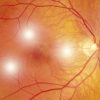Pharmacogenomics arises from the merging of medical disciplines, pharmacology and molecular genetics, and studies the correlations existing between the genetic characteristics of patients and their response to pharmacological treatments. Hereditary factors can indeed make a great difference in how drugs are metabolized in the body, making the therapeutic response and the risk of serious adverse events extremely variable.
Pharmacogenomics aims at leading to more rational approaches to therapy through a deeper understanding of genotype-dependent drug pharmacology. The growing evidences acquired in this field are allowing to administer to each individual the most effective drug for his or her genotype and to create ad hoc protocols able to optimize the therapeutic efficacy, eliminating or at least minimizing the risk of serious side effects and adverse reactions.
Many different types of correlations between genotypes and variable responses to ophthalmic drugs and treatments have been under investigation in these last years, for example in relation to the outcomes of the prolonged use of topical corticosteroids. Of particular interest are also the genotype-based responses to treatments for common ocular pathologies that can lead to vision loss, such as the those for open-angle glaucoma (OAG) and age-related macular degeneration (AMD).



